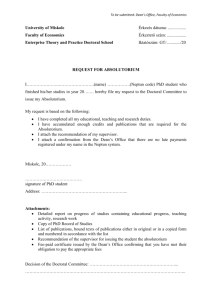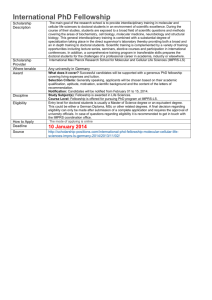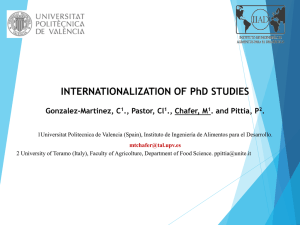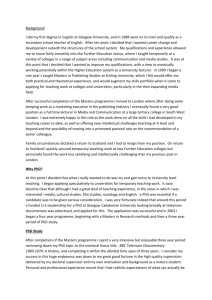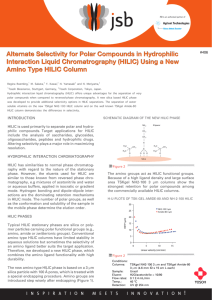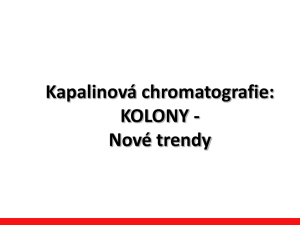industrial doctoral school
advertisement
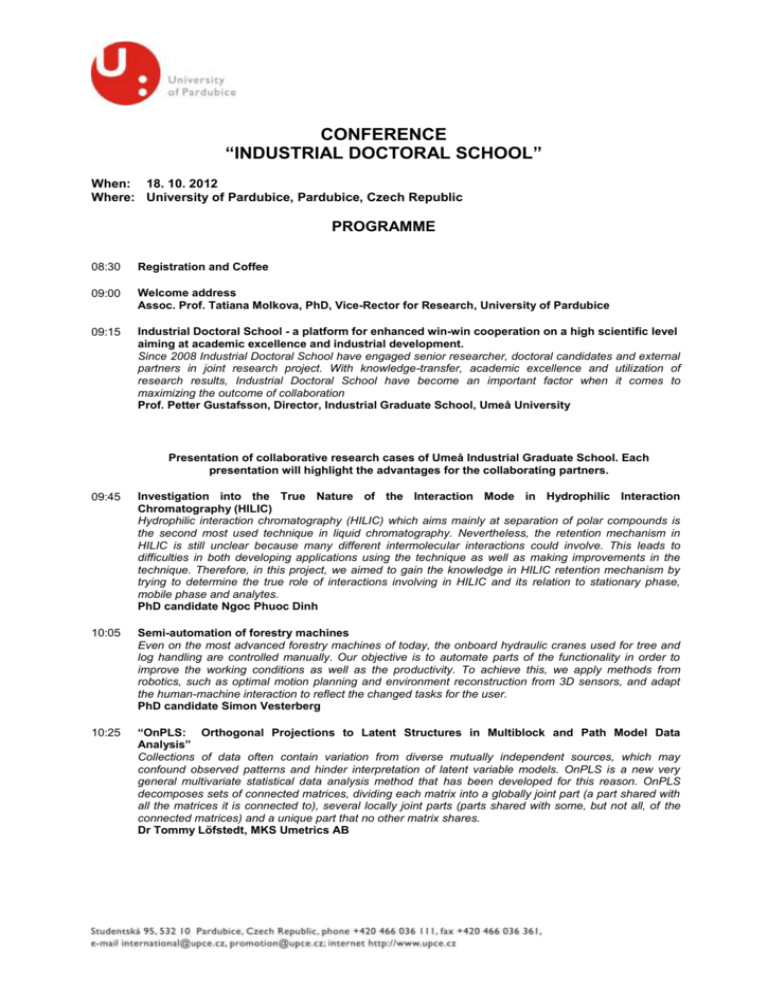
CONFERENCE “INDUSTRIAL DOCTORAL SCHOOL” When: 18. 10. 2012 Where: University of Pardubice, Pardubice, Czech Republic PROGRAMME 08:30 Registration and Coffee 09:00 Welcome address Assoc. Prof. Tatiana Molkova, PhD, Vice-Rector for Research, University of Pardubice 09:15 Industrial Doctoral School - a platform for enhanced win-win cooperation on a high scientific level aiming at academic excellence and industrial development. Since 2008 Industrial Doctoral School have engaged senior researcher, doctoral candidates and external partners in joint research project. With knowledge-transfer, academic excellence and utilization of research results, Industrial Doctoral School have become an important factor when it comes to maximizing the outcome of collaboration Prof. Petter Gustafsson, Director, Industrial Graduate School, Umeå University Presentation of collaborative research cases of Umeå Industrial Graduate School. Each presentation will highlight the advantages for the collaborating partners. 09:45 Investigation into the True Nature of the Interaction Mode in Hydrophilic Interaction Chromatography (HILIC) Hydrophilic interaction chromatography (HILIC) which aims mainly at separation of polar compounds is the second most used technique in liquid chromatography. Nevertheless, the retention mechanism in HILIC is still unclear because many different intermolecular interactions could involve. This leads to difficulties in both developing applications using the technique as well as making improvements in the technique. Therefore, in this project, we aimed to gain the knowledge in HILIC retention mechanism by trying to determine the true role of interactions involving in HILIC and its relation to stationary phase, mobile phase and analytes. PhD candidate Ngoc Phuoc Dinh 10:05 Semi-automation of forestry machines Even on the most advanced forestry machines of today, the onboard hydraulic cranes used for tree and log handling are controlled manually. Our objective is to automate parts of the functionality in order to improve the working conditions as well as the productivity. To achieve this, we apply methods from robotics, such as optimal motion planning and environment reconstruction from 3D sensors, and adapt the human-machine interaction to reflect the changed tasks for the user. PhD candidate Simon Vesterberg 10:25 “OnPLS: Orthogonal Projections to Latent Structures in Multiblock and Path Model Data Analysis” Collections of data often contain variation from diverse mutually independent sources, which may confound observed patterns and hinder interpretation of latent variable models. OnPLS is a new very general multivariate statistical data analysis method that has been developed for this reason. OnPLS decomposes sets of connected matrices, dividing each matrix into a globally joint part (a part shared with all the matrices it is connected to), several locally joint parts (parts shared with some, but not all, of the connected matrices) and a unique part that no other matrix shares. Dr Tommy Löfstedt, MKS Umetrics AB 10:45 Towards on-site enzyme production in forest biorefineries. Second generation bio-alcohol production from renewable lignocellulose feedstock has a promising potential of a sustainable development. Achieving this in an economically and environmentally viably manner is however the true challenge. On-site enzyme production may be one of the keys to unlocking this potential within the budding bio-alcohol industry, bringing the production of second generation bioalcohol one step closer to commercialization. PhD candidate Adnan Cavka 11:05 Characterization of cellulose pulps and the influence of their properties on the process and production of viscose and cellulose ethers Dr Peter Strunk, Freudenberg Household Products AB, Process- and Product development 11:25 Measurement system for detecting prostate cancer in vitro, using a piezoelectric resonance sensor. A piezoelectric resonance sensor is set to oscillate at its resonance frequency through a phase shift circuit. As the sensor comes into contact with a material, a frequency shift will occur. The magnitude of the frequency shift and the applied force are used to determine the stiffness of the tissue. Cancer tissue is harder than healthy tissue. Evaluation of the system has been made on flat and spherical tissue models made of silicone with different stiffness. PhD candidate Anders Åstrand 11:45 Credit Markets and Banking What causes the credit market to suddenly dry up and why do some banks withstand economic downturns better than others? This thesis addresses these questions in a series of papers from various out-of-equilibrium perspectives. We find that credit markets are highly unstable and tend to naturally evolve into periods of contraction, e.g. a credit crunches. Furthermore, we find that the organizational structure of banks play a key role in banks risk-return profile and test if the Swedish market for short term business loans was subject to a credit crunch during the sub-prime debacle. Dr Ulf Holmberg, Sveriges Riksbank (Sweden’s Central Bank) 12:05 The role of context in managing information infrastructure services Contemporary organizations are increasingly dependent on information infrastructures to deliver their services. However, information infrastructures are highly complex and dynamic, which lead to considerable management challenges. This research aims to contribute to our understanding of these challenges through an in-depth investigation of a team responsible for information infrastructure services at a large business and technology service company. The complexity and dynamics faced by the team emphasizes the important role of context in managing its information infrastructure services and underlying technology platform. To investigate the team’s practice we therefore adopt contextualist inquiry in combination with a pluralist approach based on four complementary theoretical lenses; technological frames of references, risk management, control versus drift, and dynamic capabilities. As contributions, this research has the dual goal to improve the teams’ practices while at the same time providing new theoretical insights about the role of context in management of information infrastructure services. PhD candidate Nils-Petter Augustsson 12:20 Lunch 13:15 Industrial Graduate School from the supervisors’ point of view 13:45 European Industrial Graduate School – Course package and group strategy Industrial Doctoral School is aiming at an increased number of PhD:s trained in collaboration. The need for specialist competence in all disciplines will increase and Industrial Doctoral School will give our candidate a platform for increased employability as wells as academic – industrial cooperation. Benkt Wiklund, coordinator, Industrial Doctoral School, Umeå University 14:15 Collaborative doctoral education at University of Pardubice Assoc. Prof. Tatiana Molkova, PhD, Vice-Rector for Research, University of Pardubice 14:45 Discussion with participants 15:20 Closing remark Assoc. Prof. Tatiana Molkova, PhD, Vice-Rector for Research, University of Pardubice 15:30 Coffee
